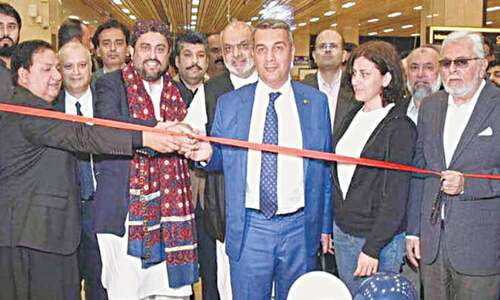A sustainable participatory irrigation system in Sindh remains a distant dream despite over two decades of Sindh Irrigation and Drainage Authority’s (Sida) mission statement, making the achievement of the sustainable development goals (SDG) in the water sector even more difficult.
Sida was established to revitalise the irrigation sector and bring a paradigm shift by switching to a participatory approach versus the conventional system which has been managed since the colonial era: the Sindh Irrigation Act 1879.
A dichotomic arrangement still exists in Sindh’s irrigation sector which is a major contributor to the country’s agrarian economy. Though the irrigation department has an irrigation minister, it is run either by the chief minister or some politically powerful individuals at the cost of water rights of small- and medium-size farmers.
Sida, being a corporate body, works under the Sindh Water Management Ordinance (SWMO) 2002. It controls only 30 per cent of the irrigation system through four, out of 14, main off-taking canals. This amounts to 1.837m ha of total irrigated area in Sindh as per the Water Sector Improvement Project (WSIP) phase-I document. SWMO 2002 has already replaced the 1997 Act.
The required number of farmers organisations (FOs), watercourse associations (WCAs) and area water boards (AWBs) have not as yet been created. These tiers form the basic structure within Sida to regulate the water governance under the participatory approach.
The required number of farmers’ organisations, watercourse associations and area water boards have not been created
Currently, one AWB is set up in the command area of each of the three Sindh’s barrages. Going by the definition of SWMO and the explanation by Sida’s officers, the entire irrigation system is to be placed under Sida’s administration.
At present, the Sida field staff, who hold lower- to senior-level, positions are from the irrigation department only to reflect a hotchpotch sort of arrangement in the organisation. Only four general managers, human resource, finance and operation side positions are filled by Sida but not without a political nod from those who matter in Sindh’s ruling party.
These field posts are to be filled through a competitive process by Sida after becoming autonomous, however, autonomy continues to elude Sida for the last two decades. Since its establishment, two managing directors — Ehsan Leghari and Rafiq Shafi were appointed through the competitive process under SWMO 2002. Mr Leghar is again part of Sida as general manager (research and development).
Cumulatively, around five million acres of the cultivable area falls under this body. Recovery of water charges (abiyana) has been, historically, unimpressive for want of a correct assessment of crops. But, the young Sida chairman Engineer Abdul Basit Soomro intends to improve it considerably. Mr Soomro says he has been able to increase abiyana recovery substantially by 38pc in three AWBs governed areas in last quarter (Oct-Dec 2019) when compared with the corresponding period in 2018. According to official stats, Rs50.55 million were recovered in Oct-Dec 2019 against Rs31.42m in Oct-Dec 2018.
The three AWBs — Ghotki feeder (Guddu barrage), Nara canal (Sukkur) and two left bank canals (Kotri barrage) regulate the irrigation system on the left bank of River Indus. The right bank areas of River Indus are considered neglected, needing more attention in terms of improved water supplies; Sida is yet to create an AWB on any of the right bank canals of the three barrages. Existing AWBs, WCAs and FOs are without formal participation of women farmers and landless peasants.
“We need some amendments in SWMO 2002 to revitalise the system in our jurisdiction,” says Mr Soomro. He believes FOs are not delivering while Sida needs a correct assessment of crops to earn more through abiyana to become self-sufficient. “Everything revolves around funds which we fail to generate while we struggle to make impressive recoveries,” says the chairman, who got this coveted slot thanks to political connections of his brother within the ruling PPP in Sindh and the former president.
Soomro, however, supports the participation of women at AWBs, FOs, WCA and in Sida’s board. He is optimistic he will be able to get the approval of the Sindh government for getting SWMO 2002 amended as needed.
Strengthening Participatory Organisation has drafted amendments in four sections of SWMO 2002 to ensure participation of women in the structures of FOs, WCAs and AWBs. These women include landless peasants and sharecroppers. The draft amendments remain pending approval in the Sindh Assembly and have not been taken up for one reason or the other.
For Sida, the $313m international award-winning WSIP is its success story. It won awards for achievement of objectives, timely completion, savings, equity and increased crop intensity in command areas where WSIP’s works were executed. These works were carried out in areas connected with Phulelli, Ghotki, Nara and Mithrao canals, adds Sida spokesman Hibzullah Mangrio. “Some structures that were 100 years old were replaced or systems were rehabilitated in WSIP,” he says.
Irrigation water is used as a tool by civil or military governments. The incidents of water theft, cries against water shortage and protest by tail-end water users are the second name of the irrigation system in Sindh. While the high and mighty get more than what they deserve, the lower riparians are deprived regardless of whether water is under Sida or the irrigation department’s control. There are areas where tail-end farmers don’t get water even for winter crops sowing.
Nara canal — one of the largest canals of Sukkur barrage on its left side — is with Sida. It has chronic water shortage pockets. With some active judicial oversight, a single officer, Mansoor Memon as director AWB Nara canal, managed to ensure water availability in tail-end areas a couple of years back.
He showed zero tolerance to everything that obstructs water availability, made sure that watercourses’ modules are rectified and cases lodged against water thieves to enable tail-end farmers to get water. This was acknowledged by the Sindh High Court Hyderabad circuit bench when it decided multiple petitions on water shortage’s point. Unfortunately, such instances are few and far between in Sindh.
And this is evident from the on-going legal battle by small farmers of the tail-end district Badin led by Khuda Dino Shah and others. These farmers did not get water in Sida-governed areas of non-perennial Phulelli canal even in Kharif 2020, though the water flows were aplenty.
Published in Dawn, The Business and Finance Weekly, October 5th, 2020















































